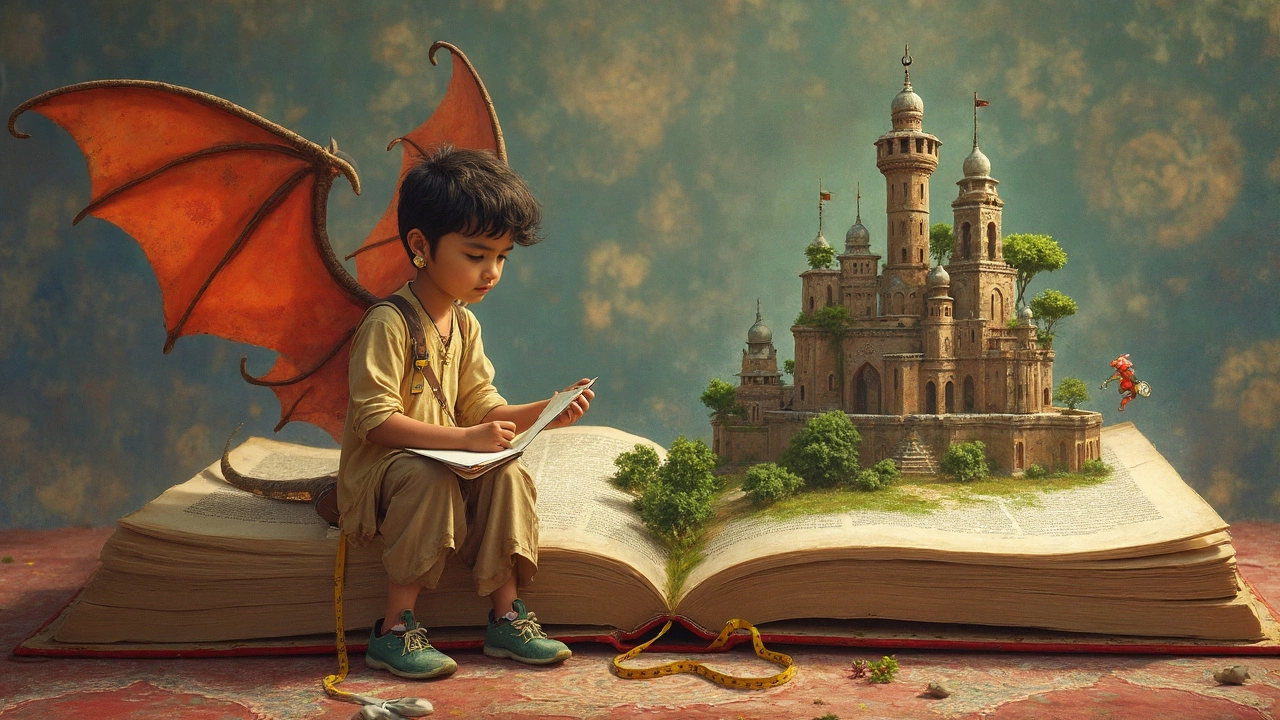Is 700 Pages a Big Book? Fantasy Fans Weigh In
 Jun, 21 2025
Jun, 21 2025
Pick up a fantasy novel at the bookstore and you’ll probably notice they’re not exactly pocket-sized. A 700-page book can look daunting, but in fantasy, that’s sometimes just the starting line. So, is 700 pages actually a big deal? Well, in most other genres, absolutely—but if you’re diving into epic worlds and wild adventures, the definition of ‘big’ changes fast.
If you’re wondering how a 700-page book compares, here’s an easy check: classic high fantasy books like Game of Thrones or The Name of the Wind are both over 700 pages, and nobody calls them small. Yet, some fantasy epics stretch well past 1,000 pages—Brandon Sanderson’s Stormlight Archive is notorious for breaking the scale. So, 700 pages is chunky, but in fantasy, it floats right in the middle of heavyweight territory.
- What Makes a Book 'Big' in Fantasy?
- How 700 Pages Stacks Up Against Popular Novels
- Why Fantasy Novels Lean Toward the Long Side
- Tips for Reading Longer Fantasy Books
What Makes a Book 'Big' in Fantasy?
So what really makes a fantasy novel feel "big"? In the world of fantasy, most books aren’t shy about stretching the page count. You’ll find that a 700-page book looks massive compared to a detective novel or romance, where 300-400 pages is about the norm. But in fantasy, thicker books aren’t just common—they’re expected, especially for those diving into new worlds with complex rules, dozens of characters, and sprawling storylines.
Most publishers start calling a novel a "long read" when it hits around 500 pages. In fantasy circles, though, the bar is a bit higher. A book usually needs to pass 600 pages before folks start calling it seriously thick. Anything past 800 pages—now you’re in doorstopper territory, often reserved for the most ambitious sagas.
It comes down to more than just word count. Here’s what pushes these page numbers so high in fantasy:
- Extensive world-building: Inventing countries, histories, maps, even languages eats up chapters.
- Huge casts: You get main characters, sidekicks, villains, and everyone in between—everyone needs backstory.
- Epic plots: Stories often stretch over years (or centuries), with multiple threads tying everything together.
To put things in perspective, check out this quick comparison:
| Book Title | Genre | Page Count |
|---|---|---|
| Harry Potter and the Order of the Phoenix | Fantasy | 870 |
| Game of Thrones | Fantasy | 835 |
| The Hobbit | Fantasy | 310 |
| Gone Girl | Thriller | 422 |
| The Goldfinch | Literary | 771 |
See that? Fantasy novels fully embrace the "more is more" spirit. So, if you pick up a novel in this genre with 700 pages, you’re definitely holding a big book by any non-fantasy standard, but in this crowd, it’s just another day at the office.
How 700 Pages Stacks Up Against Popular Novels
So, how does a 700-page fantasy book measure up next to the big hitters on everyone’s shelves? Turns out, it holds its own. Here’s the hard truth: a lot of the most famous fantasy stories aren’t exactly slim. Some are even chunkier than you’d expect, while others keep things a bit leaner—but rarely under 400 pages if they’re classic fantasy.
Let’s look at some actual numbers to put it in perspective. Here are the rough page counts for popular fantasy books:
| Book Title | Author | Page Count |
|---|---|---|
| Harry Potter and the Order of the Phoenix | J.K. Rowling | 870 |
| A Game of Thrones | George R.R. Martin | 835 |
| The Way of Kings | Brandon Sanderson | 1,007 |
| The Name of the Wind | Patrick Rothfuss | 662 |
| The Hobbit | J.R.R. Tolkien | 310 |
| The Fellowship of the Ring | J.R.R. Tolkien | 423 |
If you put your 700-page beast next to these, it’s longer than The Name of the Wind, and pretty close to A Game of Thrones or Order of the Phoenix. It dwarfs The Hobbit and even outpaces The Fellowship of the Ring. Only the real giants—like Sanderson’s The Way of Kings—outsize it. So, 700 pages? You’re definitely carrying more than your average bookworm, but you’re not quite in ‘doorstop’ territory yet.
One thing you might notice: when a book passes 600 pages, it almost always lands in the fantasy section. Contemporary novels and mysteries usually tap out around 400-500. So if you’ve got a 700-pager, you’re pretty much holding a true badge of fantasy geekdom.

Why Fantasy Novels Lean Toward the Long Side
If you’ve ever wondered why fantasy books always seem to pack so many pages, you’re definitely not alone. Here’s the basic truth: worldbuilding in fantasy takes space. Authors need to lay out new lands, magic systems, creatures, histories, and sometimes even languages. It’s hard to pull that off in a slim volume. For instance, Tolkien spent a huge chunk of The Lord of the Rings just getting readers familiar with Middle-earth—and that’s before the main plot even kicks in.
Another reason? Fantasy stories are big on epic plots with multiple characters and storylines that weave together. If Game of Thrones had to fit everything into 300 pages, half the characters probably wouldn’t even speak. That’s why high fantasy in particular, with its sprawling kingdoms and endless prophecies, prefers a higher word count.
Series are also a big factor. Most fantasy novels aim to hook you in for more than one book, so the first entry often sets the stage at length. Long books give you the setup you need to care about what comes later. That’s a huge reason why you see 700 pages (or more) on so many spines in the fantasy section.
| Book Title | Page Count | Book Series |
|---|---|---|
| A Game of Thrones | 694 | A Song of Ice and Fire |
| The Name of the Wind | 722 | The Kingkiller Chronicle |
| The Eye of the World | 782 | The Wheel of Time |
| Stormlight Archive: Words of Radiance | 1088 | Stormlight Archive |
Plus, readers actually expect longer books in fantasy. Some even judge a story by its thickness. If you walk through the fantasy aisle, you’ll notice people picking up the biggest books—they want that sense of a full journey, not a quick trip.
So, when you see a fantasy novel breaking the 700-page barrier, it’s not just about showing off. It’s about giving you more world, deeper stories, and a reason to stay up way too late reading just one more chapter.
Tips for Reading Longer Fantasy Books
If you’re staring down a 700-page chunk of fantasy and feeling a little overwhelmed, you’re definitely not alone. Big books can look like a serious commitment, but they don’t have to feel impossible to finish. Here’s how you can make it way easier to get through those massive stories without losing track or steam.
- Set a steady reading routine. Even reading 20 pages a day can move you through a large book before you know it. Many readers use apps like Goodreads or StoryGraph to track progress and stay motivated.
- Don’t be afraid to take notes or tab important pages. Fantasy novels are famous for complicated worlds, wild magic systems, and tons of characters—jotting down quick reminders can save your brain later on.
- Break the book into chunks. Some folks use the chapter breaks for this, but you can also pick natural stopping points (after big reveals or when you finish a major quest arc). This makes the whole thing less overwhelming and gives you that nice 'I finished something!' feeling.
- Try the audiobook version. Lots of popular fantasy novels have fantastic narrators. Listening can help you squeeze in reading while walking, cleaning, or commuting. Major releases like The Wheel of Time series or Brandon Sanderson novels have well-reviewed audio editions.
- Find a buddy or an online reading group. It’s easier to keep turning pages if you can geek out about plot twists and world-building with someone else. Reddit’s r/Fantasy and Discord servers are packed with other enthusiastic and very supportive readers.
Don’t stress if you have to reread a section or take a break. The key is to keep enjoying the process—because the real magic of fantasy is getting lost in another world, not racing to the last page. Tackling a thick book like this can feel way less intimidating once you realize everyone else flips back to the map or glossary sometimes, too.